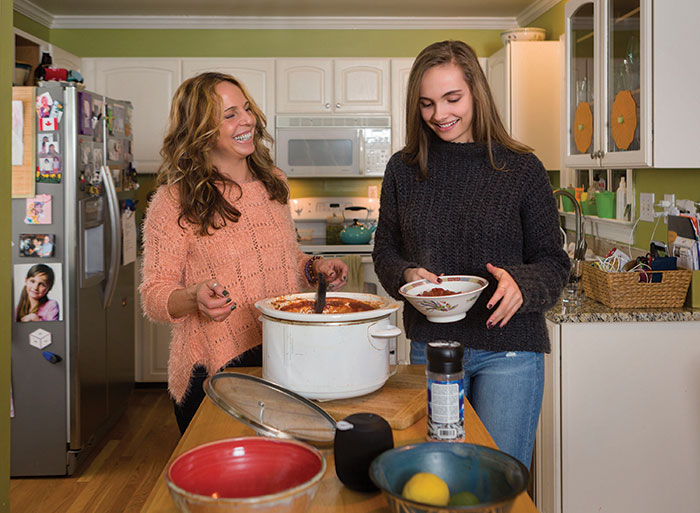SAFEchild helps keep children out of harm’s way each and every day. The nonprofit serves roughly 900 families annually, providing parenting education and other supportive programs. Its hard-hitting mission? To eradicate child abuse.
“Wherever a child or family needs us, we try to be there,” said Cristin DeRonja, executive director of SAFEchild. “We don’t say you’re not bad off enough to need us, and we don’t say you’re too far gone for us to help you.”
SAFEchild, an acronym for Stop Abuse For Every child, was founded by the Junior League of Raleigh in 1992. Members researched domestic abuse in Wake County and determined that children would be best served if families were supported directly. The key would be to help caregivers develop better parenting skills and to become a resource for Wake County Social Services and other public and private agencies.
“What SAFEchild directly provides is that parental intervention, guidance and support when you, as a parent, have been pushed to your limit and don’t know a healthy way to manage your frustration and anger,” said DeRonja.
Programs at SAFEchild serve a variety of clients, from caregivers who are deemed at-risk of abusive behavior by the legal system to parents who need general guidance.
Two court-mandated programs are Men Engaged in Nurturing Strategies (MENS), which helps fathers understand and break the cycle of domestic abuse, and Mothers Overcoming Violence through Education and Empowerment (MOVE), which helps mothers minimize the impact of domestic violence on their children.
Programs open to the general public include Welcome Baby, a year-long mentoring program for first-time mothers, and Nurturing, which guides parents through the developmental stages in children and teaches positive discipline techniques.
Kirsten Miller participated in the Welcome Baby program 15 years ago after the birth of her daughter, Leila Johanna Elmore. A native of Canada, Miller was new to motherhood and to Wake County. After searching for support groups, she stumbled upon SAFEchild.
“I was assigned a mentor, a Canadian, Ellen, who had four girls of her own,” said Miller. “She came to see me a couple times a week. She hung out, answered questions, helped me with breastfeeding, and just everything. Once a week I met at the SAFEchild house with a big group of new mothers — some I’m still friends with.”
SAFEchild works with children through their identified caregivers. Whether referred, mandated or self-initiated, they must take the initial step to enroll in a program, says DeRonja. Every adult and child in the home participates in the program.
The exception is the Funny Tummy Feelings program, a one-hour interactive presentation on physical and sexual abuse for first-graders. The goal is to empower children: to identify inappropriate behavior in adults, to determine when and how to respond effectively, and to find a trusted individual to talk about his or her feelings.
DeRonja, who still presents the program, says she taught these skills to her own four children.
7-11 p.m., Thursday, March 22
The Pavilions at the Angus Barn
Celebrate SAFEchild’s first 25 years with dinner, wine, a silent and live auction, and more.
“We know that children are not always in situations and in environments where there’s a protective or appropriate adult,” she said. “We can’t just leave them out there lost, without the right language, without the right knowledge to know what to do in those situations. We do send literature home to the families, so they are aware that SAFEchild has presented the program to their child in school.”
The newest development in SAFEchild’s programming is the Advocacy Center, a community-based center that provides evaluations for children when there is suspicion of abuse or neglect. The nonprofit collaborates with Wake County Child Protective Services, law enforcement, medical professionals and other local organizations to bring together in one location all the services the children and their families need.
“Before we opened that center, children had to travel to Greenville, Durham or Chapel Hill to receive the treatment and intervention that they needed,” said DeRonja. “Our state’s capital city and county did not have these services. Talk about a huge gap.”
DeRonja considers SAFEchild a gift to the community, sustained and grown over the years by a number of individuals, local businesses and foundations.
“We truly believe in turning a corner for any child’s future and restoring hope and healing for that child and that family,” she said.






